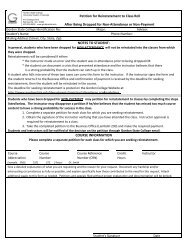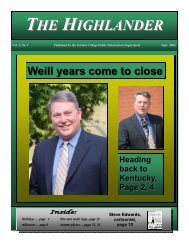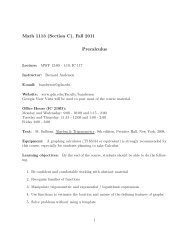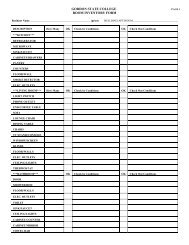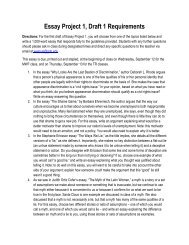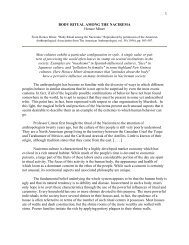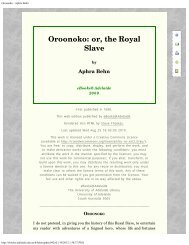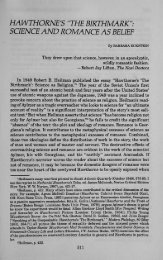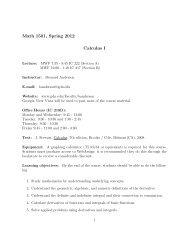President's Report - Gordon State College
President's Report - Gordon State College
President's Report - Gordon State College
Create successful ePaper yourself
Turn your PDF publications into a flip-book with our unique Google optimized e-Paper software.
5<br />
President’s <strong>Report</strong><br />
Then Congressman Max Burns with Prime Minister Ariel Sharon<br />
during a visit to Israel.<br />
President George W. Bush, Congressman Charlie Norwood and<br />
Max Burns.<br />
During this time with Oxford, he earned his master’s in business<br />
information systems at Georgia <strong>State</strong> University in 1977, and<br />
his son Andrew was born.<br />
Years passed and his second son, Nathan, was born, and Burns<br />
earned his Ph.D. in business from Georgia <strong>State</strong> University.<br />
He still remembers his interview with Georgia Southern University’s<br />
dean of business, Origen J. James Jr.<br />
“He asked me if I was brilliant,” Burns said. “I laughed and<br />
said no, but I was a hard worker.” Apparently this was a good<br />
answer, because Burns was hired.<br />
At this time, 1983, Georgia Southern was about the size of<br />
<strong>Gordon</strong> <strong>State</strong> <strong>College</strong> today, about 5,000 students, and it was undergoing<br />
a tremendous growth period. It was a great time to learn<br />
how to live through and guide such growth, he said, but it’s hard<br />
to manage if it comes too fast.<br />
When he joined Georgia Southern, he moved his family to<br />
his Sylvania farm, which was in reasonable commuting distance<br />
to the university. A bit of culture shock was involved in the move,<br />
since they were moving from the Alpharetta area north of Atlanta<br />
to the very rural southeast of Georgia, but in time, the farm became<br />
home in the deepest meaning of the word.<br />
Asked what crops he grows, Burns chuckled and said pine<br />
trees. Behind the chuckle is the memory of some of the money he<br />
has lost in trying to farm, and some of the hard lessons of farming,<br />
as in the time he went to see Willard Roundtree for advice about<br />
planting oats.<br />
Roundtree, a long-time friend of his father’s, had a lifetime’s<br />
experience as a farmer and he knew his stuff. “Boy,” he said, “you<br />
plant oats during the full moon of October.”<br />
But it was too late in the year for him to plant in October, so<br />
Burns asked if there was another time.<br />
A second time, Roundtree repeated his words.<br />
“You plant oats during the full moon of October.”<br />
Burns realized Roundtree’s second round of advice came with<br />
some additional meaning. He was being told that if he didn’t have<br />
the time to be a farmer, he shouldn’t be one.<br />
“This is good advice in any vocation,” Burns said.<br />
So what then does he grow on his 225 acres<br />
Pine trees, grass and about 35 beef cattle, he said.<br />
He likes that his two sons were young when they moved to<br />
Sylvania and were able to grow up on a farm, although not quite<br />
the working farm of their grandfather’s. In contrast, Burns had<br />
farming chores that were tough enough and critical enough to<br />
teach him a disciplined work ethic that has sustained him throughout<br />
his life.<br />
“By the time I was 6 or 7, I was picking cotton and<br />
feeding livestock.” Between pigs and cows, Burns said he would<br />
choose cows every time. “I’ve made a deal with God,” he said. “If




